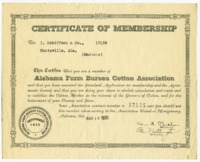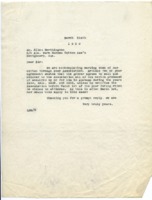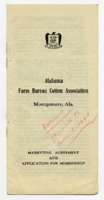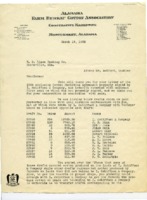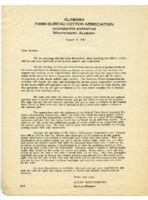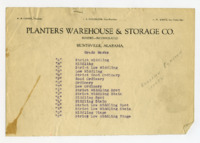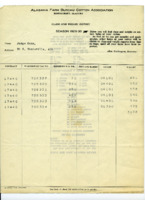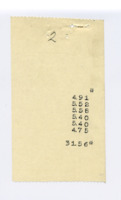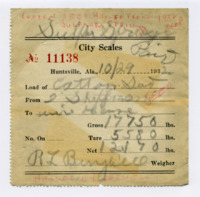
Browse Items (94 total)
Sort by:
-
Certificate of membership in the Alabama Farm Bureau Cotton Association.
From the business records of I. Schiffman and Company. The certificate was issued to I. Schiffman & Co. on March 19, 1930. -
Correspondence between I. Schiffman and Co. in Huntsville, Alabama, and Allen Northington of the Alabama Farm Bureau Cotton Association in Montgomery, Alabama.
From the business records of I. Schiffman and Company. In the first letter, Lawrence B. Goldsmith of I. Schiffman and Co. inquires about selling cotton through the Alabama Farm Bureau Cotton Association. In his reply, Northington asserts that "we will be glad to handle any cotton for you that was grown on your farm and make the government advance up to 15.64� Middling basis." -
Alabama Farm Bureau Cotton Association Marketing Agreement and Application for Membership.
From the business records of I. Schiffman and Company. The application for membership was completed by Lawrence B. Goldsmith, a member of the I. Schiffman & Co. firm. The front of the pamphlet notes that this copy is a duplicate. -
Correspondence concerning cooperative marketing of Huntsville-area farmers' cotton.
From the business records of I. Schiffman and Company. The letters contain lists of farmers whose cotton I. Schiffman & Co. is marketing through the Alabama Farm Bureau Cotton Association. The materials include notes from each farmer instructing the Association to hold their cotton in the "regular annual pool [...] subject to lien on same held by I. Schiffman & Company." Each letter indicates the value of the cotton. -
Materials regarding prices and cooperative marketing of the 1930 cotton crop.
From the business records of I. Schiffman and Company. The materials include letters and instructions for handling and delivering the 1930-31 cotton crop to the Alabama Farm Bureau Cotton Association. The instructions describe the different pools available for marketing cotton and lists warehouses throughout Alabama to be used for storing cotton. The last item, a letter from N. S. Stewart, discusses low cotton prices since 1926 and lists advantages of marketing cotton through the Association. -
Planters Warehouse & Storage Co. Grade Marks.
Grade marks as specified for Planters Warehouse & Storage Company in Huntsville, Alabama. Handwritten note: Anderson Clayton Grades. -
Class and Weight Report.
This is the class and weight report for the Alabama Farm Bureau Cotton Association based on the 1929-1930 cotton season. -
Receipt.
This receipt totalling $31.56 has no indication of its origin. -
Cash advance and receipt for cotton.
Receipt of check tendered as a cash advance from Judge Cain for six bales of cotton at 15.64 cents per pound, signed by Judge Cain, and the dray receipt from Planters Warehouse & Storage Co. from Judge Cain for the six bales of cotton. The final document is a draft receipt showing the 6 bales of cotton from the annual pool for Judge Cain. -
Receipts from 1931-1932 for I. Schiffman and Company.
Various receipts for cotton from multiple companies and farms including Sulphur Spring, Weil farm, Tibbs farm, Morris farm, Cobb farm, and Pierce farm.
